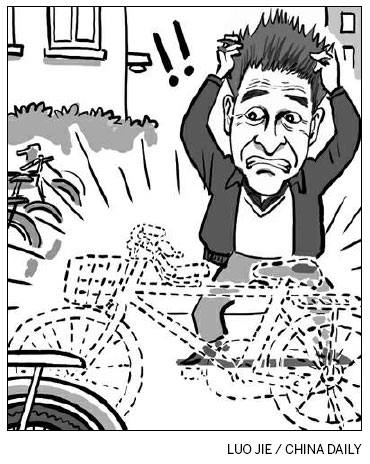
I felt a sense of disbelief. My bicycle was no longer where I had parked it.
It must be a common feeling for Beijingers.
I've had two cycles stolen. One from outside China Daily.

I walked up and down the rank of 30 bicycles. Had someone moved it? No, it was gone.
I resigned myself to my loss. After all, I'd been given the machine for free and I had a spare.
Bicycle number two (my spare) was stolen a few weekends ago. It was my own stupid fault.
I parked it outside our apartment block, locked it and forgot to take out the key.
Next morning it wasn't there.
I mentioned the theft to a Chinese friend. He suggested we visit a cycle store where he had bought his classic bicycle, a Flying Pigeon.
Too expensive for me. No, he assured me, he paid only 460 yuan ($73). He gave me a lift to the store near Huixinxijie Nankou underground. Together we probably weighed 140 kilograms. His bike didn't waver.
"That's the one for you," Jason said, indicating a dark green Flying Pigeon.
He went to negotiate a price. The cycle was shop-soiled, slightly rusty and scratched, but otherwise in good condition.
I agreed to pay 500 yuan, with a basket included in the price. One pedal was buckled, so both were replaced. I cycled home. Compared to my previous bicycles, this was like driving a limousine: slow, smooth and silent.
A Chinese friend remarked on the dark green livery and China Post logo on the mudguard. What I have is a post office bicycle, probably surplus equipment.
It's a classic Flying Pigeon model PA-O2, with sit-up-and-beg handlebars. It is single speed, has 28-inch wheels, a sprung saddle, rack and rod brakes and a rear carrier.
It's virtually indestructible and weighs a ton (well, 44 kilos or 98lbs actually).
The first Flying Pigeon came off the assembly line in Tianjin on July 5, 1950. The company logo was a dove, the symbol of peace.
Revolutionary China in the 1950s became the kingdom of bicycles (zixingche wang guo). In the 1960s and 70s the Flying Pigeon cycle was the single-most popular vehicle on earth. Millions were built.
Deng Xiaoping, who launched the Chinese economic recovery in the late 1970s, defined prosperity as "a Flying Pigeon in every household".
Young Chinese newly-weds would count themselves lucky if they began married life with "three rounds and a sound": a bicycle, wristwatch and sewing machine; and a transistor radio.
In those days a Flying Pigeon cost 150 yuan, about two months' salary. There was a waiting list of years. The Chinese government gave gifts of Flying Pigeons to US president George Bush Sr, Italian Prime Minister Romano Prodi and to President Fidel Castro of Cuba.
So I'm in good company. Several Flying Pigeons were exported to California where they were regarded as "proletarian chic".
My first priority was to secure my bike. I now have two chains and a wheel lock. You would need huge bolt cutters to steal my cycle.
But of course there are gangs who specialize in stealing bikes. In a Beijing police crackdown a few years ago 3,700 people were arrested and more than 11,000 stolen bikes recovered at 27 secondhand cycle markets. This was only the tip of the iceberg.
I asked a Chinese colleague if I could insure my bicycle. She burst out laughing at the absurdity of my suggestion.
Another colleague told me she had had eight bicycles stolen in 20 years. She has invested in a hardened steel cycle lock costing 250 yuan.
"But that's almost as much as I paid for my Flying Pigeon," I wailed.
The answer is: If you live in Beijing, don't get emotionally attached to your bicycle.
The trouble is, I already have.
